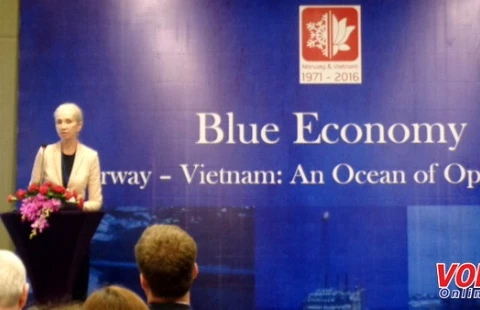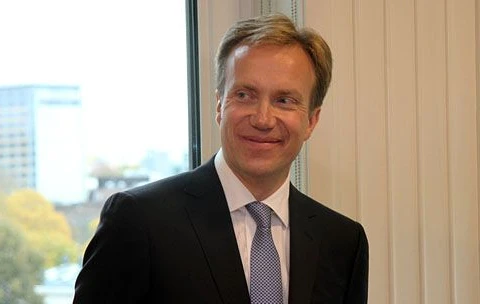Hanoi (VNA) - Norway supports the move towards closer regional cooperation in Asia, said Børge Brende, Foreign Minister of Norway in his recent article.
The following is the full text of his article.
“Norway supports the move towards closer regional cooperation in Asia. Over the past generation, the global economic centre of gravity has been moving towards Asia, this economic shift is now accompanied by deepening cooperation in the region. Norway supports this development, and over the past few years we have actively sought to strengthen relations with Asia.
Here I would like to outline the main reasons for this, and describe the areas where we see the greatest potential for future cooperation. Norway has made an effort to join some of the most important arenas for political and economic cooperation in Asia. In 2012, we were accepted as a member of the Asia-Europe Meeting (ASEM), the principal meeting place for political dialogue between Asia and Europe. ASEM is a valuable and effective arena for political discussions with our Asian and European partners. Then in 2015, Norway gained sectoral dialogue partner status with ASEAN, the first medium sized economy outside the region to do so.
One of our main reasons for approaching Asia has been to increase trade and investments. Asia currently accounts for 30 % of the global gross domestic product, and the Asian Development Bank estimates that by 2050 this will have increased to over 50 %.
In countries like India and China, growth has been accompanied by the lifting of hundreds of millions of people out of poverty. Vietnam graduated from being one of the poorest countries in the world, to a middle income country in 2010. Moreover, at a time when free trade is under pressure, many countries in Asia are taking laudable steps towards removing trade barriers between them. Norway is a strong supporter of free trade, and we recently gathered over 20 countries in Oslo to move the free trade agenda of the WTO forward, in preparation of the WTO ministerial meeting in Buenos Aires in 2017. Norway’s trade with Asia is both deepening and widening.
ASEAN is today our fourth largest trading partner. With Vietnam alone, our trade has increased by more than 30 % this past year. And we want to increase our trade with Asia even further. As a member of the European Free Trade Association, Norway has given priority to negotiating free trade agreements with a number of Asian countries, including Hong Kong, Philippines, Singapore, South Korea and Vietnam. Negotiations are also underway with India, Indonesia and Malaysia.
Norway’s economic links with Asia date back several centuries. In the 1850s, when China and India accounted for around 50 % of global GDP, and Tokyo was a capital with several million inhabitants, the Norwegian merchant navy was the largest in the world. Norwegian ships, together with thousands of Norwegian seamen, played an important part in the economic growth of Asian countries 150 years ago.
Still today, Norwegian companies in the maritime sector continue to play a vital role in many Asian countries. At the same time, there are also important investments in fisheries, hydropower, and oil and gas. In total, around 500 Norwegian companies have been established in Asia, increasing foreign direct investment in the region.
The Norwegian public sector is also investing in Asia. The Norwegian Government Pension Fund Global, one of the world’s largest sovereign wealth funds with almost USD 900 billion invested abroad, has placed over 20 % of its equity investments in Asia. As a sign of our commitment to further regional integration in Asia, Norway became a founding member of the Asian Infrastructure Investment Bank (AIIB) earlier this year, providing USD 550 million in capital.
It is no coincidence that the two most recent Norwegian diplomatic missions to be opened are in Asia, in Mumbai and Yangon. Another key area in our cooperation with Asia is the 2030 Agenda and the Sustainable Development Goals. We are united by a common interest in solving global challenges such as education, health and climate change. Norway is engaged in extensive cooperation with Indonesia on reducing deforestation through REDD+, and we have pledged USD 1 billion for these efforts. Norway is also supporting Vietnam’s efforts to transform its forest sector and collaborate with neighbouring countries in the Mekong region to reduce deforestation. Other areas where we can make a difference are the maritime sector and fisheries.
World-leading Norwegian companies in these sectors have already invested in Asia. Drawing on the extensive experience of the Norwegian Government, we hope to stimulate green shipping and sustainable fisheries and fish farming in the region. Ensuring that the oceans are healthy and productive for future generations is a key priority for Norway's foreign policy, and we are currently working on a new government strategy to move this agenda forward, including in Asia. A third broad area of interest in our cooperation with Asia is the promotion of peace and stability, international law and human rights.
Norway has acted as facilitator in peace processes in a number of Asian countries, with particular focus at present on the Philippines, where formal negotiations are now taking place. We are a strong defender of human rights, and earlier this year Norway hosted the sixth World Congress Against the Death Penalty, which was attended by representatives from over 80 countries. Global change is profoundly affecting Asia – in terms of economic development, in the tectonic shifts of global politics, and in the increasingly serious impacts of climate change. We are part of the same international community, and are all affected by these developments.
We therefore stand ready to work with Asian nations both directly and through regional arenas for cooperation to seek sustainable solutions and stable development in Asia.”-VNA























